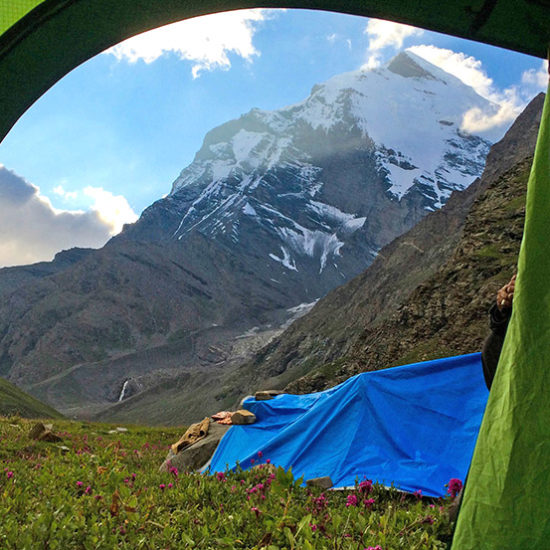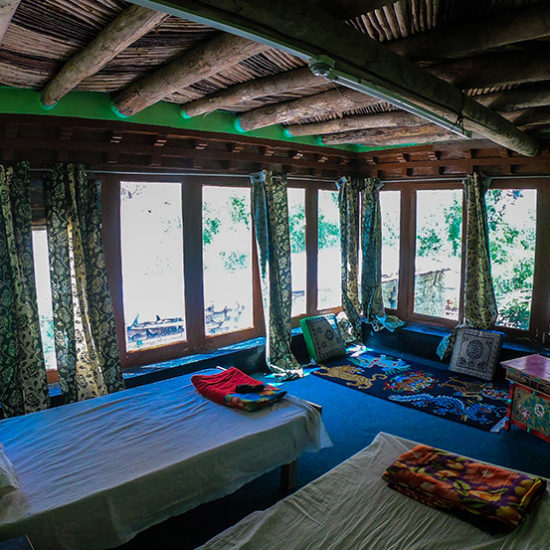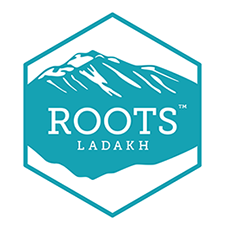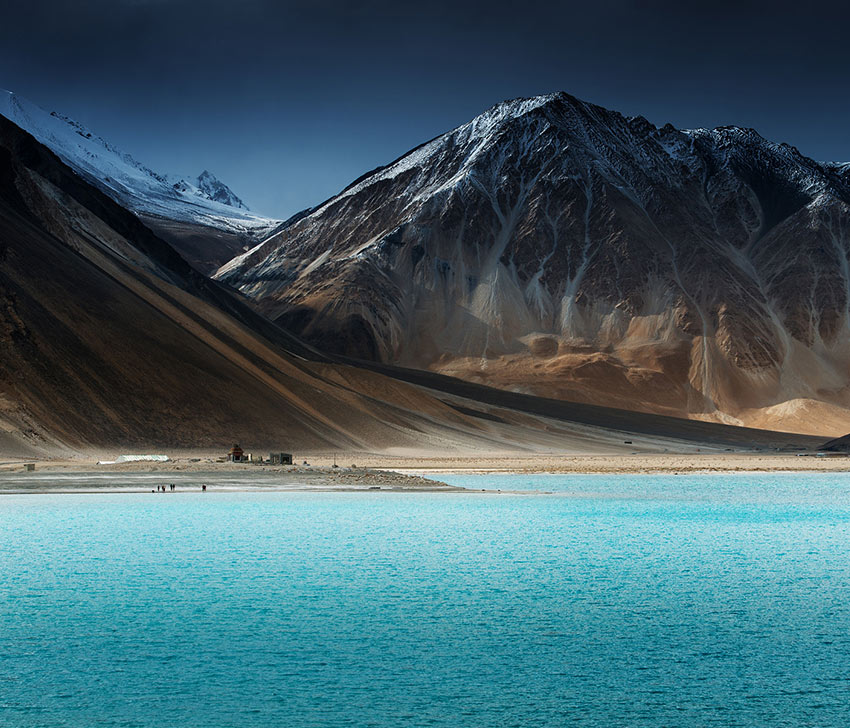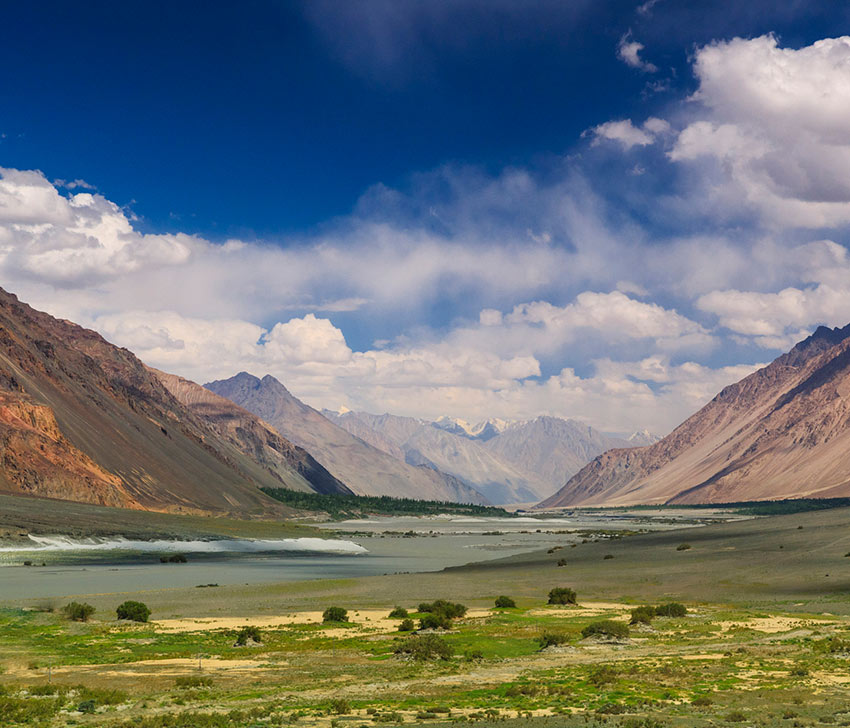On The Silk Route – Ladakh Overland
A cultural road trip across the Trans-Himalayas along the ancient silk route from Kashmir to Ladakh. An offbeat journey along a beaten trail. Stay in unique locations and heritage properties, sample local cuisine and crafts, and bathe in a hot spring. Discover the ancient silk route heritage through food, architecture, crafts and landscape.
10 Nights/ 11 Days Kashmir, Kargil, Leh Download PDF
-
Tour StartsLeh
-
Tour EndsLeh
-
Style of TourJeep Tour
-
Max Altitude5800 m
-
Best Seasonmid april to mid may
-
StaysHotels, Cottages, Homestays
-
MealsBreakfast and Dinner
1
Day 1: Arrive in Srinagar. Heritage Tour of Srinagar city and Dal Lake
- Pick up from the airport and drive to the homestay. Check into your charming homestay, explore the property and have a simple lunch at the home-stay
- If you arrive early, we step out to drive upto Badaam wari, one of the lesser known Mughal Gardens, more popular amongst the locals. As a group, we head to lunch, at a local eatery for authentic Kashmiri wazwan, and drive along the Dal lake to the walnut wood studio located in the north of Srinagar
- Spend an hour with the master craftsmen at their workshop. Visit their shop at Hazratbal market
- Drive to Pari mahal, an observatory built by Dara Shikoh during the Mughal period. One can see a panoramic view of the Dal lake from here
- A short shikara ride on the lake to enjoy the sun set before returning to the homestay for dinner.
2
Day 2: Srinagar to Kargil via Zoji La (3530m)
- Today after breakfast, we will say goodbye to the lovely hosts at the homestay and begin our journey towards Kargil.
- We will pass through the picturesque Sonamarg meadows and stop here for a quick grub..
- From here we will continue towards Zojila pass which also known as the “Gateway to Ladakh”. You will notice the sudden shift in the landscape from green alpine pastures to barren and raw mountainscapes as soon as you cross Zojila.
- Make a quick stop over at the Kargil War Memorial in Drass. Continue towards Kargil and check into your hotel by evening. Dinner and overnight at the hotel.
3
Day 3: Hundurman Border Village Experience
- In the ancient times, Kargil was an important stop on the great Silk route.
- Today’s we will visit the Munshi Aziz Bhat Museum, a small family operated museum that has preserved the Silk Route trade heritage of Kargil through a collection of some rare and unique artifacts
- Post this, we will continue our journey to the border village of Hundurman which was once a small thriving village on the silk route. Today it falls on the Line of Control between Indian and Pakistan. We will spend the day exploring this village with a local host, visit the 500 year ruins.
- Spend the night at the homestay and experience the local way of life.
4
Day 4: Kargil to Nimmu via Namki La (3700m) and Foto La (4108m)
- After an early breakfast we’ll drive towards Leh via Mulbek and Lamayuru. Mulbekh and Lamayuru are beautiful villages along the national highway with old monasteries.
- Stop by to visit the iconic Lhonpo House at Henasku village
- Take a detour and visit the ancient Alchi monastery and have lunch at the Alchi Kitchen.
- Arrive in Nimmu by late afternoon and check into the charming Nimmu House, a heritage building beautifully restored as a retreat
- Spend the evening exploring the village and relaxing by the bonfire.
- Dinner and overnight at Nimmu House.
5
Day 5: Nimmu to Leh via Hemis Monastery. Leh Old City Walk.
- Leh is at an hour’s drive from Nimmu.
- We will drive towards Leh and explore Leh today. Start by visiting Hemis monastery and have lunch at a local eatery and continue to explore Leh market.
- Take a walk through the Leh old town, central Asian Museum and walk up to the Leh Palace. Spend the night a homestay/hotel in Leh..
6
Day 6: Leh to Turtuk via Khardung La (5800m)
- Early morning, we will drive towards Nubra via Khardung La.
- This used to be summer route for traders between Ladakh and cities of Central Asia such as Yarkand and Kashgar
- Nubra is also the point where the Great Himalayas, Karakoram and the Hundu Kush mountains converge
- Continue towards Turtuk, a green oasis in the middle of the desert.
- Turtuk is a frontier village (like Hundurman) inhabited by the Balti community. Ethincally they belong to Baltistan and speak a sub-Tibetan language, similar to Ladakhi.
- Explore this beautiful village on foot with a local host. Discover central Asian architecture, crafts and food.
- Turtuk enjoys longer summers and has an abundance of fruits like apricots and apples.
- July is a great time to witness village life in action. .
- There is also a small museum run the local royal family that preserves the legacy of the royal lineage along with other trade related memorabilia
- Lunch at a local homestay
- One can also carry books to donate to a charming little public library in the village.
- Overnight at a homestay.
7
Day 7: Turtuk to Panamik Hot Springs
- Post breakfast we will dirve to Panamik, a hot spring known to have healing benefits due to its sulphur content. It is quite popular among the locals..
- A dip here is highly recommended for everyone. There are changing rooms and shower area available
- Check into the exquisite Lchang Nang Retreat, set amidst an orchard of elm, apricot, and apple trees, further blessed by the continuous flow of the Siachen river rushing past its western boundary
- Spend the evening walking the sand dunes and watch the sun set behind the Karakoram
8
Day 8: Panamik to Pangong Lake via Shayok
- Drive from Panamik to Pangong lake via Shayok
- This is an adventurous and offbeat route along the Shayok river
- Arrive at Pangong Lake by late afternoon just in time for the sunset.
- Check into your cottage by the lake
- Don’t forget to experience the most starriest sky of your lifetime
- Dinner and overnight at the camp
9
Day 9: Pangong Lake to Tsomoriri Lake via Mahe
- Leave early today after breakfast to visit one of the most pristine lakes in Ladakh, Tsomoriri.
- We will drive via Mahe through the Changthang region.
- This area is known the Changa nomads who are known to have dwelled in these high plains rearing the world’s best quality pashmina goats
- This route extends into the Takhlamakan desert which was once a thriving trade trail on the Silk Route.
- Arrive in Korzok, a village nestled along the lake Tsomoriri and check into a local the Tsomoriri Camp and Resort
- Take a walk along the lake in the evening. Tsomoriri is also great location for people who enjoy birding, especially during spring when the Black Necked Cranes migrate here during the mating period.
10
Day 10: Tsomoriri Lake to Stok via Puga Hot Springs
- Today is the last leg of this epic road journey along the ancient Silk Route
- Wake up to the beautiful view of this pristine lake
- Post breakfast we will drive back towards Leh
- Enroute we will take quick detour to the Puga Hot Springs, a unique geothermal phenomenon. While you cant take a dip here but to witness this natural wonder is indeed a rare experience.
- End your journey at the gorgeous Stok Palace, lovingly restored into a luxury heritage hotel.
11
Day 11: Check out and leave for Delhi.
- Early morning airport transfer
- INCLUSIONS
- EXCLUSIONS
- ADDITIONAL INFO
Inclusions:
Transport:
- Airport transfers
- Vehicle throughout the journey
- All meals during stays
- Packed lunch for the road
- Twin sharing rooms at all locations
- Onsite first aid
- Oxygen cylinder
- Trained and experienced guide
- Inner Line Permit
Exclusions:
- Single room accommodation
- International & Domestic flight fares, visa charges
- Monument/monastery and Museum visit fee
- Any expenses of personal nature such as mineral water, laundry.
- Cost incurred due to emergency evacuation
- Any kind of insurance, such as accident, theft, medical, evacuation etc.
- Tips to porters, camping team, driver, guide, etc.
- Cost incurred due to change / extension in the itinerary due to roadblocks, bad weather condition, flight delays, vehicle breakdowns, etc.
Mountain Ethics
- We have a zero trash tolerance policy. We always clean up after ourselves on all hikes and trips
- We use portable T3 tents and portable toilets and wash basins at our campsite which are cleared and wrapped up at the end of each journey.
- Our camp locations are temporary and we don’t keep any permanent fixtures at the location. We say no to plastics
- Be Local – there is no harm learning at few local words while you are there. It always helps in building a rapport with the locals and blend in. Try to eat and buy locally. Carry your own water bottles.
- We use comfortable mattresses with -10degree sleeping bags
- There is no electricity at most of our campsites as they are at remote locations. We use solar powered tent lamps.
- Our trips require a moderate level of fitness.
- The maximum altitude for treks can go upto 6100m
- Drink lot of water to stay hydrated and to avoid mountain sickness
- We always carry a first aid kid and a portable oxygen canisters for emergencies
- Average of two guides are provided for a group of 10 people
- We respect the local traditions and customs. We will always brief you regarding these each time you travel to a different location. We encourage you to be open and free while travelling to these locations and invite you to explore the region in its true sense.
- We focus on engaging local communities in our work to create livelihoods locally. Most of our camps/homestays are managed by the local villagers and local youth is engaged as guides/hosts
- We organize workshops to train local communities and youth for technical training in mountain guiding, hospitality and responsible tourism. If you are interested in contributing, do let us know.
- Srinagar – Dove Cottage /
- Hundurman – Homestay
- Kargil – The Kargil
- Nimmu – Nimmu House
- Leh – Grand Dragon
- Turtuk– Homestay
- Panamik – Lchang Nang
- Pangong – The Hermitage
- Tsomoriri – Tsomoriri Camp & Resort
- Stok – Stok Palace Hotel
- Please understand that we are going to be living in a local home so you are expected to respect the local culture and traditions.
- The rooms are basic with carpeting. Single cots with fresh linens will be provided
- Traditionally, food is eaten sitting down with the food placed over a cloth known as the “Dastarkhwan”.
- Spoon is usually not used while eating.
- Toilets are traditional dry pit system outside the house. It is an age old method used to naturally decompose the human waste which is later on used a manure for farming. We also provide CleanWaste technology toilet commode with an odour free degradable waste bag.
- Water supply is scare and waster for washing is provided in buckets Pre-boiled water will be provided for drinking
What to carry?
- Valid ID proof (Passport/Voter ID/Drivers Licence)
- Comfortable walking shoes
- One down jacket or warmer for chilly nights
- Rain poncho or jacket/windcheater (a must!)
- Sun block
- Hat
- Sun goggles
- Flashlight with extra batteries (preferably wearable)
- Water bottle, preferably wide mouthed, with at least one litre capacity
- Personal toiletries
- In Hundurmanthe homestay uses only dry pit Ladakhi toilets and water for washing will be provided in buckets.
- Hot spring in Panamik is not a private experience. Expect other travellers and locals using the same facility.
- We discourage using plastic bottles and encourage you to use water bottles which can be refilled.
- We encourage you to prefer and purchase locally made products and produce that support community livelihood.
- You are expected to carry your own luggage. If you need a porter/mule during treks please inform us in advance.
- Delays are expected on account of roadblock & weather conditions. Our effort will be to continue with the trip as per the schedule & make you as comfortable as possible. But in such situations we may have to compromise on the campsite & adjust to these situations then & there. The final call will be taken by our Lead Guide on location.
- The itinerary should be viewed as ideal & we may have to make some spot changes due various unavoidable reasons.
- The distances & altitude mentioned in the above itinerary are to the best of our knowledge & information; marginal variance in the actual distances & altitudes is possible.
- You are expected to be in reasonable shape and fitness, being able to walk for several hours at a normal pace
- All outdoor related activities involve a certain level of risk. You are expected to sign an Indemnity Form in agreement to the risks involved through part taking in such outdoor activities.
- Roots Ladakh reserves the right and permission to use photographs of individuals and photographs submitted by them on tour for use in promotional and publicity purposes

